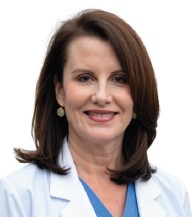Although more than 1 million women in the U.S. go through menopause each year, it still seems mysterious to a lot of us.

That’s why Novant Health gynecologist Dr. Claire Bowles is passionate about educating women about what to expect — and when to seek help. Bowles is treating women at a Novant Health virtual (online) clinic focused exclusively on menopause.
Here, she discusses why menopause symptoms vary so much from woman to woman, when it’s time to seek help for symptoms, and why getting help can be such a struggle.
You deserve individualized care — so you can get back to living your best life. Schedule a virtual menopause clinic appointment now.
How do you start a conversation about menopause with women?
Menopause is often described as “puberty in reverse.” Just like puberty, it is a natural transition when hormone fluctuations can cause many symptoms over months to years. Also just like puberty, you deserve to understand what’s happening to your body and how to navigate it with care and support.
Next, I remind women that our menstrual cycles naturally evolve with each decade. While menopause brings significant changes, know that you'll be able to navigate these shifts just as you've adapted to changes throughout your life.
How do you know when you’re starting the menopause transition?
Sometime in your 40s (or even late 30s for some women), you may begin experiencing new symptoms like irregular periods, weight gain, anxiety, decreased libido, bloating, irritability, food cravings, or feeling overwhelmed. Often, women describe it as “bad PMS.”
For many women, this is a sign that you're in the first stage of the menopause transition: perimenopause (which means “around menopause”). Perimenopause refers to the transitional period leading up to menopause, during which a woman’s body begins to undergo hormonal changes and preparation for the end of the reproductive years. Your body is starting to make less estrogen and progesterone, and the supply of eggs in your ovaries is decreasing.
As you continue this transition, the flow, frequency, and length of your menstrual cycle will change, and you may start experiencing other symptoms. Up to 80% of women deal with hot flashes. Other symptoms include night sweats, difficulty sleeping, vaginal dryness, joint pain, mood swings, memory problems, sexual challenges, anxiety, brain fog, and more frequent bladder infections.
The length of time spent in this transition really depends on the person. Perimenopause can last anywhere from a few months to up to 10 years, with an average duration of 4 to 5 years.
When are you officially ‘in menopause’?
Menopause is officially reached after you have gone 12 consecutive months without a menstrual cycle and your ovaries can no longer reproduce. Menopause is the point in life when a woman has permanently stopped menstruating and marks the end of her reproductive years. I always suggest women keep a menstrual calendar to help them keep track.
The average age at which a woman in the U.S. enters menopause is 52.
Why do menopause symptoms vary from woman to woman?
Best doctors. Amazing nurses. Remarkable care.
Click here to read more about our exceptional women's health care.
Hormone fluctuations are thought to cause the symptoms. Your hormone levels and symptoms can vary month-to-month. Some women’s hormone levels drop quickly, and others may take years. This is one cause for that variance.
Lifestyle choices also make a difference. For example, smokers go through menopause at an earlier age and have more severe symptoms than non-smokers. Your overall health history, including whether you have given birth or not, also plays a role in symptoms and when they start.
Race, ethnicity, and culture also seem to influence symptoms and the length of the transition. Unfortunately, this is an under-researched area.
Additionally, some women enter menopause as a result of surgeries that remove their ovaries. They enter menopause immediately after surgery, and often have more severe symptoms.
When should women seek treatment for menopause?
There’s a common misconception that you must wait until you’re "in menopause" to treat the symptoms, and that's not true.
Women often wait until things become overwhelming before acknowledging, “I think I need help.” We are busy juggling responsibilities — caring for our families, children, aging parents — and we tend to push through, holding it all together and just “white knuckling” our way through.
But I encourage women: come to us as soon as your symptoms start interfering with your quality of life. There are lifestyle and medication options that can help you with symptoms from weight gain to brain fog to sexual challenges — so be as honest as possible about what you're experiencing, even when the topic feels “taboo.”
Many women have avoided hormone replacement therapy (HRT) because of the Women’s Health Initiative (WHI) research published in the early 2000s looking at the long-term use of hormone replacement for chronic disease prevention. Initial research highlighted an increased risk of breast, cancer, heart, disease, stroke, and blood clots associated with hormone therapy.
Later analysis showed that these risks varied depending on the patient’s age and time since menopause onset. Now we believe that initiating hormone replacement closer to menopause may offer benefits that outweigh risks for some women, and stress the importance of personalized medicine.
Decisions regarding whether or not to start hormone therapy should consider individual factors such as age, health history, and specific treatment goals. Some women may choose not to try HRT, and that is completely fine — we have other effective options available.
When they get the right treatment, patients tell me it can be transformative. They feel like themselves again.
Why do so many women struggle to get the menopause care they need?
Menopause is "unique" because it’s almost diagnosed retrospectively, after it’s occurred. Especially early on, when they may just have one or two symptoms, women may visit a provider who doesn’t specialize in menopause and get dismissed or sent in the wrong direction because no one has recognized they’re in the menopause transition. Or sometimes, women self-treat symptoms, but don’t address the root causes.
As they get deeper into the transition, sometimes women aren’t sleeping, they’re struggling with focusing, they’re forgetting their words, and they’re still trying to be on point with their job and family responsibilities. It’s not the easiest time to be your own advocate.
And because menopause is so different from woman to woman, there's not an algorithm for what will work. You need individualized care, and that takes time. It’s understandable that women may not want to interrupt their workday and dedicate their valuable time to seeing a specialist.
Note: Dr. Bowles continues to provide in-person care for her existing patients in Charlotte.
Why this gynecologist is excited to lead new virtual menopause clinic

Dr. Claire Bowles talks a lot about menopause — both on and off the clock.
As a woman in her 50s, menopause “is a passionate discussion for everyone in my world,” Bowles said. “I can't go to lunch with my friends without someone bringing it up.”
If you’re in the same boat, Bowles has a goal for you: “I always tell my patients I want them to be the most informed voices in any discussion.”
And being able to provide individualized education that empowers women is what Bowles is most excited about as she leads Novant Health’s new virtual menopause clinic.
“Women support so many others in their lives,” Bowles said. “They deserve to gain knowledge, understand their options, and get support as they go through this transition.”
Bowles, Dr. Jennifer Mitch and family nurse practitioner Lisa Rutherford are now treating women in individualized, virtual sessions tailored to you, focusing on the symptoms that are bothering you, the questions you have, and ways you can support your body through the transition.
There's a lot of misinformation out there, and a lot of information you can find is not personalized to you. You deserve individualized care — so you can get back to living your best life. Click here to schedule a virtual menopause clinic appointment now.













